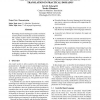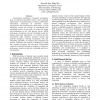1225 search results - page 156 / 245 » Design Principles for Intelligent Environments |
106
Voted
ECAL
2005
Springer
15 years 8 months ago
2005
Springer
The classical approach to using utility functions suffers from the drawback of having to design and tweak the functions on a case by case basis. Inspired by examples from the anim...
128
click to vote
ECAL
2005
Springer
15 years 8 months ago
2005
Springer
This paper is about the design of an artificial neural network to control an autonomous robot that is required to iteratively solve a discrimination task based on time-dependent s...
119
Voted
COLING
1992
15 years 3 months ago
1992
Knowledge-based interlingual machine translation systems produce semantically accurate translations, but typically require massive knowledge acquisition. Ongoing research and deve...
129
click to vote
PERCOM
2009
ACM
15 years 9 months ago
2009
ACM
—One part of the vision of ubiquitous computing is the integration of sensing and actuation nodes into everyday objects, clothes worn on the body, and in large numbers into the e...
134
click to vote
IPPS
2005
IEEE
15 years 8 months ago
2005
IEEE
Conventional performance evaluation mechanisms focus on dedicated distributed systems. Grid computing infrastructure, on another hand, is a shared collaborative environment constr...


